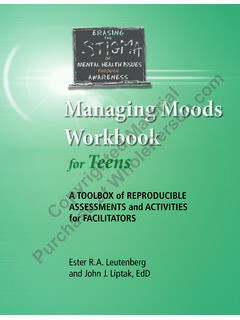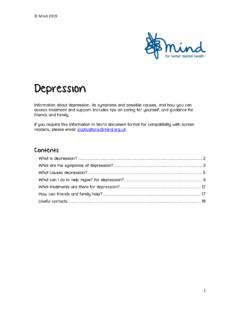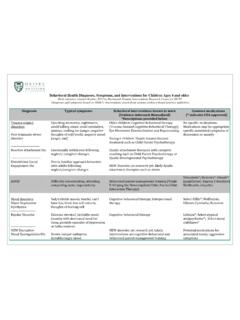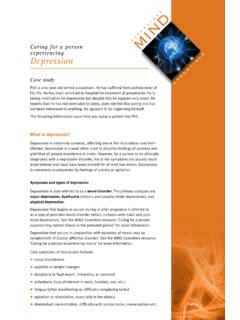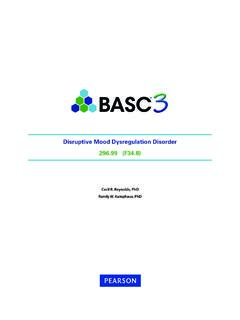Search results with tag "Dysthymia"
managing moods Managing Moods Workbook for Teens …
wholeperson.comDysthymia – Person has a mild depression that lingers for more than two years. For people with dysthymia, life has little pleasure. They tend to be cranky, irritable, and testy. • Postpartum Depression – Person experiences depression after childbirth. Sometimes called . baby blues
Depression - Mind
www.mind.org.ukDysthymia – continuous mild depression that lasts for two years or more. Also called persistent depressive disorder or chronic depression. Prenatal depression – depression that occurs during pregnancy. This is sometimes also called antenatal depression. Postnatal depression (PND) – depression that occurs in the weeks and months
Behavioral Health Diagnoses, Symptoms, and Interventions ...
www.dhhs.nh.govDysthymia ----- Bipolar Disorder ----- NEW Disruptive . Mood Dysregulation Dis. Sad/irritable moods, tearful, can’t have fun, tired, low self-esteem, thoughts of hurting self ; Extreme elevated /irritable mood (mania) with decreased need for sleep, possible episodes of …
CDC Promotes Public Health Approach to Address Depression ...
www.cdc.govDysthymic disorder, or dysthymia, is a long-term (two years or longer) depressed mood for most of the day, for more days than not, accompanied by two or more of the following: poor appetite or overeating, insomnia or sleeping too much, low energy or fatigue, low self-esteem,
Caring for a person experiencing depression
www.health.qld.gov.aumajor depression, dysthymia (chronic and usually milder depression), and atypical depression. Depression that begins or occurs during or after pregnancy is referred to as a type of perinatal mood disorder (which includes ante-natal and post-natal depression). See the MIND Essentials resource ‘Caring for a person
Persistent Depressive Disorder (Dysthymia) 300.4 (F34.1)
images.pearsonclinical.comWith persistent major depressive episode: Full criteria for a major depressive episode have been met throughout the preceding 2-year period. With intermittent major depressive episodes, with current episode: Full criteria for a major depressive episode are currently met, but there have been periods of at least 8 weeks in at least the
Disruptive Mood Dysregulation Disorder 296.99 (F34.8)
images.pearsonclinical.comdisorder, separation anxiety disorder, persistent depressive disorder [dysthymia]). Note: This diagnosis cannot coexist with oppositional defiant disorder, intermittent explosive disorder, or bipolar disorder, though it can coexist with others, including major depressive disorder, attention-deficit/
DSM-5 Depressive Disorders: Diagnostic and Treatment ...
www.lacounseling.org(Dysthymia) •Essential feature: Depressed mood plus at least two other depressive symptoms •Duration: The symptoms persist for at least two years (one year for children and adolescents) •May include periods of major depressive episodes (double depression) •Rule outs: Be sure it is not due to another
Bipolar Disorder - Gevirtz Graduate School of Education
education.ucsb.edumood is called dysthymia when it is chronic or long-term. In the middle of the scale is normal or balanced mood. At the other end of the scale are hypomania and severe mania. Some people with bipolar disorder experience hypomania. During hypomanic episodes, a person may have increased energy and activity levels that are not as severe as typical ...
Behavioral Health Provider Manual - Aetna
www.aetna.comdysthymia, depression not otherwise specified, or bipolar depression - Who are diagnosed with anxiety disorders, such as generalized anxiety, panic disorder, or post-traumatic stress syndrome • Aetna members ages 18 and older who have an alcohol problem, including alcohol dependence or a more severe alcohol use disorder
